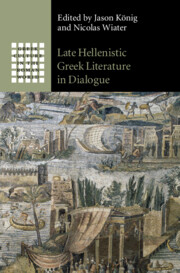Book contents
- Late Hellenistic Greek Literature in Dialogue
- Greek Culture in the Roman World
- Late Hellenistic Greek Literature in Dialogue
- Copyright page
- Contents
- Figure
- Contributors
- Preface
- Abbreviations
- Introduction
- Chapter 1 The Empire Becomes a Body
- Chapter 2 Pyrenaean Mountains and Deep-Valleyed Alps
- Chapter 3 Sailing the Sea, Sailing an Image
- Chapter 4 Ecocritical Readings in Late Hellenistic Literature
- Chapter 5 Civic and Counter-Civic Cosmopolitanism
- Chapter 6 The Wrath of the Sibyl
- Chapter 7 Imagining Belonging
- Chapter 8 Philosophical Self-Definition in Strabo’s Geography
- Chapter 9 Narrating ‘the Swarm of Possibilities’
- Chapter 10 ‘Asianist’ Style in Hellenistic Oratory and Philostratus’ Lives of the Sophists
- Chapter 11 Greek Reading Lists from Dionysius to Dio
- Chapter 12 Envoi
- References
- Index Locorum
- General Index
Chapter 7 - Imagining Belonging
The Use of Athens in Hellenistic Rome
Published online by Cambridge University Press: 21 April 2022
- Late Hellenistic Greek Literature in Dialogue
- Greek Culture in the Roman World
- Late Hellenistic Greek Literature in Dialogue
- Copyright page
- Contents
- Figure
- Contributors
- Preface
- Abbreviations
- Introduction
- Chapter 1 The Empire Becomes a Body
- Chapter 2 Pyrenaean Mountains and Deep-Valleyed Alps
- Chapter 3 Sailing the Sea, Sailing an Image
- Chapter 4 Ecocritical Readings in Late Hellenistic Literature
- Chapter 5 Civic and Counter-Civic Cosmopolitanism
- Chapter 6 The Wrath of the Sibyl
- Chapter 7 Imagining Belonging
- Chapter 8 Philosophical Self-Definition in Strabo’s Geography
- Chapter 9 Narrating ‘the Swarm of Possibilities’
- Chapter 10 ‘Asianist’ Style in Hellenistic Oratory and Philostratus’ Lives of the Sophists
- Chapter 11 Greek Reading Lists from Dionysius to Dio
- Chapter 12 Envoi
- References
- Index Locorum
- General Index
Summary
Contemporary scholarship on fandom explores how communities are created through affinities of taste. Drawing on that work, this chapter argues that Cicero’s account in De Finibus and Pro Archia of his and his fellow Romans’ investment in and debt to Athenian literature experiments with the effects of passionately identifying with another culture – thus opening up ways of thinking and feeling about citizenship as an aesthetic property that transcends the limits of ethnic or linguistic identity. Hellenistic literature, organiSed in part around the trope of Athens as a universalist model of human excellence – a trope used first by Athenian writers and appropriated by writers in both Greek and Latin in the first century BCE – helps make the concept of universal citizenship thinkable, not only for Romans like Cicero but for readers over centuries (including scholars and students of 'classics' today) who shared and sustained his investment in the Athenian Greek past. This fantasy of cultural belonging obscures the violence of Roman imperial reality and helps explain the persistent appeal of 'classical' Greek literature.
- Type
- Chapter
- Information
- Late Hellenistic Greek Literature in Dialogue , pp. 211 - 230Publisher: Cambridge University PressPrint publication year: 2022
- 1
- Cited by

